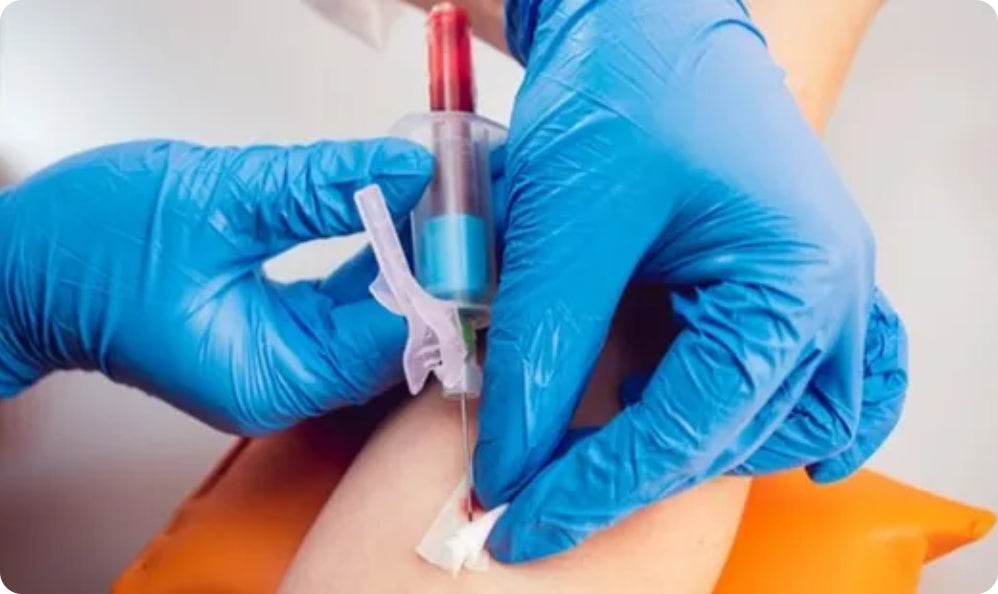
Men’s Hormones – The Role of Testosterone and More in Men’s Health
At BloodTekUK, we know that hormones play a crucial role in men’s health too. Testosterone, often called the male sex hormone, influences everything from muscle mass to mood and sex drive. Here’s why hormone testing is so important for men:
Low Testosterone (“Low T”)
Testosterone levels naturally decline with age, starting around age 30. By midlife or older, some men develop testosterone deficiency (hypogonadism), leading to fatigue, low libido, erectile dysfunction, depression, and increased body fat. A blood test can measure testosterone levels, and if they’re low, treatments like testosterone replacement therapy can help improve quality of life, energy, and mood.
Sources:
NHS on 'male menopause': https://www.nhs.uk/conditions/male-menopause/
"Male Menopause" Symptoms
While men don’t have a clear menopause like women, many in their 40s and 50s experience symptoms like mood swings, irritability, reduced strength, weight gain, and low enthusiasm. This can be related to gradual testosterone decline. A blood test can confirm if testosterone is below the normal range for your age, helping distinguish hormonal issues from other causes like stress or psychological factors.
Sources:
NHS on 'male menopause': https://www.nhs.uk/conditions/male-menopause/
Fertility and Sexual Health Concerns
For men facing fertility issues or sexual dysfunction, blood tests can provide insight. Measuring testosterone levels can help reveal if a hormonal imbalance is affecting sperm production or erectile function. It's important to note that while testosterone is essential for sperm production, external testosterone supplementation can suppress the body's natural production of sperm. Therefore, men desiring to preserve fertility should avoid exogenous testosterone use.
Sources:
Exogenous testosterone: a preventable cause of male infertility: https://pmc.ncbi.nlm.nih.gov/articles/PMC4708215/
Sport Performance and Hormones
Hormones play a crucial role in athletic performance, influencing muscle growth, endurance, recovery, and overall physical capability. Blood tests to monitor hormone levels, particularly testosterone and cortisol, can provide valuable insights into athletic progress and training efficiency.
- Testosterone: This hormone is key for building muscle mass, maintaining strength, and promoting recovery. Athletes with higher testosterone levels often experience improved endurance and faster recovery after intense training sessions. Testosterone also contributes to red blood cell production, which is crucial for oxygen transport during physical exertion.
- Cortisol: Known as the stress hormone, cortisol is released during physical stress. While it’s necessary for regulating energy levels, excessive cortisol production, especially over prolonged periods, can negatively impact muscle mass, fat storage, and overall recovery. High cortisol combined with low testosterone often indicates overtraining, which can impair performance and increase injury risk.
- Testosterone-to-Cortisol Ratio: Monitoring the testosterone:cortisol ratio is particularly important for athletes, as it helps assess the balance between anabolic (muscle-building) and catabolic (muscle-breaking) processes. A high ratio generally signifies optimal recovery and performance, while a low ratio may indicate that the body is under stress or not recovering properly.
- DHEA (Dehydroepiandrosterone): DHEA helps maintain energy levels and muscle function. Low levels of DHEA can lead to fatigue and reduced physical performance, especially during prolonged training periods.
- Prolactin: Elevated prolactin levels can interfere with recovery, reduce libido, and hinder motivation, which in turn affects athletic progress.
Regular hormone testing can help athletes optimize their performance by identifying imbalances, guiding recovery strategies, and enhancing overall health. By maintaining a proper balance between these hormones, athletes can achieve peak performance and prevent overtraining and burnout.
Sources:
“Monitoring the training effect in different periods in elite athletes” by Yen-Ting Lin & Chen-Kang Chang: https://core.ac.uk/download/pdf/41690233.pdf?
Baseline Knowledge for Peace of Mind
Some men prefer to know their hormone levels as a baseline—like an MOT for their body. Getting a testosterone baseline can be useful for tracking changes over time. For men with risk factors like obesity or Type 2 diabetes, regular testosterone testing can be part of managing overall health.
Sources:
NIH on Testosterone level in men with type 2 diabetes mellitus and related metabolic effects: A review of current evidence: https://pmc.ncbi.nlm.nih.gov/articles/PMC4364844/#:~:text=Conclusion,really%20causing%20adverse%20clinical%20outcomes
Empower Yourself with Hormonal Insights
Blood tests give men the ability to address issues like aging, performance, and well-being head-on. Whether it’s low energy, changes in libido, weight gain, or sports performance issues, knowing your hormone levels can help guide your next steps. At BloodTekUK, we make it easy to test your hormones and take control of your health.
Take Control of Your Health Today
Don’t just accept feeling tired or low—book your blood test with BloodTekUK today to check your testosterone and other vital hormones. Whether you visit our clinic or use our At-Home Blood Testing Kit, we’ve made it easy to get the answers you need for a healthier, more energetic life.
Sources:
- NHS on 'male menopause': https://www.nhs.uk/conditions/male-menopause/
- Exogenous testosterone: a preventable cause of male infertility: https://pmc.ncbi.nlm.nih.gov/articles/PMC4708215/
- “Monitoring the training effect in different periods in elite athletes” by Yen-Ting Lin & Chen-Kang Chang: https://core.ac.uk/download/pdf/41690233.pdf?
NIH on Testosterone level in men with type 2 diabetes mellitus and related metabolic effects: A review of current evidence: https://pmc.ncbi.nlm.nih.gov/articles/PMC4364844/#:~:text=Conclusion,really%20causing%20adverse%20clinical%20outcomes





